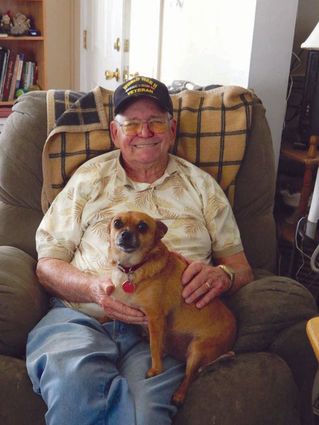Memorial Day and Memories
Highlighting Our Heroes

Glen Jackson, 90, pictured with his dog Tawney, shares memories of his WW II tour of duty as a crew member on a B-17 bomber over Germany.
Your writer remembers (years ago) when Memorial Day (before it became just another three-day weekend celebrated on the last Monday in May rather than May 30 as it had been for years) was set aside for special events and services honoring our various branches of military who had died. It was a big deal.
In more recent times it seems that we just get too busy to remember what Memorial Day really is all about. But, if you ask someone who has served their country, it still is a big deal to honor the lives of those who fought and died in their efforts to keep America free.
We often recall clichés like "war is hell," "freedom really isn't free," "America, the land of the free because of the brave" etc. But how often do we stop to consider that wars aren't won by planes and tanks alone – it takes "boots on the ground," some filled by men, some filled by women and some of the four-legged variety to win the war? Your writer spoke recently with two of our WW II veterans here in Tehachapi and you bet your bottom dollar they remember!
Glen Jackson, now 90, but then was a young lad of 18. He joined what was then the Army Air Force. He was only 19 when he went overseas to be stationed in Peterborough, near London, England. Glen was a radio operator gunner and fought the war from the lofty heights of a B-17 bomber.
"I remember our first mission," he said quietly. "It was over Berlin. We were a new crew and had never flown together before. But we had the best pilot there, Bill Brackby. Most of us were only 18 or 19 and certainly were impressionable. While we didn't fly every day, remember London was being bombed, so we also saw what the Germans were doing to the country on the ground. We were lucky and only lost one man, Harry Bernstein, during the 33 missions we flew."
"Each time we went up we just hoped we'd make it back. We were scared s...less. Every flight was memorable. I can remember our crew 'retired' one bomber. When we got back we all got out and kissed the ground. One of the wings was so badly shot up we stood under it and pushed it up and down – just like a big bird flying. Needless to say, we were pretty happy to be back on the ground!"
"We had a good crew and in the air we functioned like a well-oiled machine. But once back on the ground we fought amongst ourselves but also fought for each other when we had to. I remember thinking that the English people weren't terribly friendly to us. They seemed to resent us 'yanks' coming over to fight. One woman even asked me 'What are you doing here?' And, of course, being young and a bit brash, I replied 'Saving your ass.'"
"I remember one of the local pubs had a sign outside that said 'No dogs or Americans allowed.' However, we did get served when we suggested we'd tear the place apart if the sign meant what it said," he laughed.
Glen, like many serviceman of his time, doesn't speak much about his experience. "If asked, I'll answer questions," he said, "but it's not something I go around bringing into a conversation. I was only there for six months but I was proud to be there. I was also glad I didn't see any more action than I did and was very grateful to come home in one piece."
Glen will be traveling to Washington, D.C. with the Honor Flight on May 6 to see the WW II memorial.
Another of our local WW II veterans, Emery Hubbard (who will be 90 in May) fought at the Battle of the Bulge during the same time Glen was flying the skies. Emery saw the war from a totally different view: from the ground and in shoes and leggings because his feet were too wide to fit in regular combat boots.
"I was 19 and at Visalia Junior College when I was drafted," Emery recalls. "I trained with the 65th Infantry Division in Mississippi. But I was hurt during training and spent seven weeks in the hospital. By the time I recovered, the 65th had already deployed and I ended up being transferred to the 75th Division."
Emery's unit didn't have a direct route across the "Pond," he remembers. "We had to zig-zag across because we were dodging German subs," he said. "We finally landed at Liverpool and then went on to Le Harve, France. I remember having to transfer from one ship to another on the water. It was stormy and rough and the rope ladders weren't easy to navigate. One of our guys fell off between the ships and was killed when the ships smashed back together. We got off to a rough start."
"Once on the ground we had another situation. It was cold and windy and there was snow on the ground. One of the guys built a fire – unfortunately right on top of an unseen bomb. And, of course, the bomb exploded and sent shrapnel flying. Many of the guys were injured before we really got to where we were going."
"We were called the 'Diaper Division' because we were all so young and new to the area. Despite our nickname, we took our job of stopping the Germans very seriously."
While Emery suffered only from a frost-bit leg, there were 290 from the 75th who were either killed in action or later died of the wounds they received. "It's hard to talk about," he shared. "I think more so now than it was when I came home."

Emery Hubbard, soon to be 90, shares memories of his 75th Infantry Division experiences during WW II and the Battle of the Bulge.
Emery served in a cannon squad and didn't have warm, safe accommodations when night came. "I remember it was really cold. We'd sleep in the snow with our cannon and didn't often have access to showers etc. I remember once being in the same clothes for four weeks before we got relieved to make it back to camp. We just took the clothes off and threw them away," he said. "We spent the night and then were ordered out again the next morning."
Emery was never hit by gun fire or rockets, but he did have some close calls and saw a lot of casualties "But I think hearing them call for help was even harder," he said emotionally. "You couldn't go out in the dark and help them because you never knew if you might step on a land mine. It was really difficult."
Emery, like Glen, was really glad when everything was over and he was able to come back home. Glen and Emery both agreed: "We had a job to do and we did it. Our job was to stop the Germans, and we did."
Check below for more information on the Memorial Day Parade.



